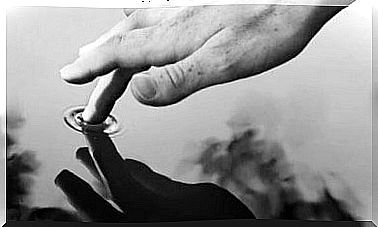The Mourning Of A Couple’s Separation

As with all processes in which a loved one is lost, mourning the couple’s separation can be very complicated. Many people, when ending a relationship, are invaded by a series of emotions that they do not know how to control, especially if the decision is unilateral or, simply, the other disappears without any explanation.
However, grief for a couple’s separation is very similar to other types of grief. This has one big advantage: Psychologists have spent many decades studying how to overcome losses. Therefore, there are many tools that can help us improve in the face of a love breakup. Let’s go deeper.
Phases of mourning the separation of a couple
The process of mourning the end of a relationship goes through five phases. The peculiarity is that they can be presented in a slightly different way than they appear when a loved one dies. However, the basic structure is the same.

So when our partner breaks up with us, it’s normal for us to go through five steps:
- Denial
- Anger
- Negotiation
- Depression
- Acceptance
These phases do not need to appear in the same order for everyone. So someone could start with anger, then jump into denial, and then move on to depression. Another person, perhaps, gets stuck between negotiation and depression, jumping from one to the other for a long time.
The key is to remember that all of these emotions are perfectly normal. Furthermore, we must take into account that, in the face of a couple’s separation, grief almost inevitably appears if there are very strong feelings. Therefore, understanding what each phase consists of can significantly alleviate emotional pain.
Let’s see each one.
1- Denial step
The first of the phases we go through when we lose a partner is denial. In the case of separations, the affected person is not able to believe that the relationship is over. Therefore, continue to act as if at any moment the other person is going to come back.
Depending on the person, this can happen in different ways. For some, the breakup appears to be no more than a normal, recurring fight. In these cases, the affected person believes that soon there will be a reconciliation. For others, on the other hand, it will be clear that this is the end, but they believe that, with a little effort, they will be able to get their former partner back.
If you think you’re at this stage, you need to start looking at what happened head-on. Denying reality will only bring you more suffering in the long run.
2- Step of anger
Once a person accepts that the relationship is over, feelings of hostility and anger often arise. They play a key role: they allow emotional pain to be less intense.
Some of the typical thoughts of this step are as follows:
- “He didn’t deserve me.”
- “I’m better off without her.”
- “He doesn’t know what he’s missing.”
However, this mental dialogue hides large amounts of resentment and pain. To move forward with the grieving process, it is necessary to understand that the ex-partner is a normal and ordinary person, who is just acting in the best way he knows how. Only with this understanding is it possible to dilute the anger and move to the next phase.
3- Negotiation stage
In negotiation, the person experiencing grief tries to win back the ex-partner in any way possible. Thus, romantic gestures, supplications or even emotional blackmail may appear. This is especially true of people with certain personality types, such as histrionics or depressives.
The only way to get through this step is to accept that the ex-partner will not return. Only then will it be possible to advance to the next phase of mourning.
4- Depression stage
During this phase, the person finally accepts that their ex will not return. However, the process of overcoming grief over the separation is not over yet. In the depression stage, the prevailing belief is that you cannot live without the other person.

So some of the most common thoughts at this stage are as follows:
- “I’ll never find someone like that.”
- “I will die alone”.
- “I won’t be fine again.”
- “No one will love me like him/her”.
The messages a person sends to himself are mostly irrational thoughts. To finish overcoming grief, it is necessary to accept that it is possible to be fine without the other, and that losing this relationship is not such a terrible thing.
5- Acceptance step
The last stage of grief occurs when the person finally accepts what happened. Besides, he realizes that he doesn’t need the other to be well. At this point, the affected person can rebuild their life and even start a new relationship in a healthy way.
The time taken to go through the five phases of grief for separation depends on each person. If you are getting over a breakup right now, you must be patient with yourself. The only key thing is that you step forward little by little and actively work on your recovery.







